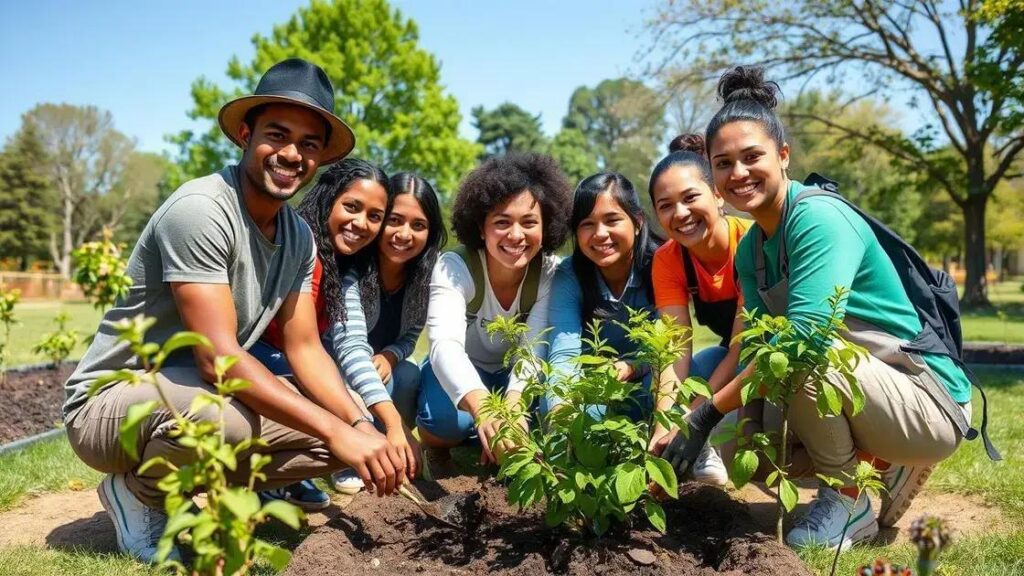The benefits of volunteering for emotional well-being include enhancing happiness, building social connections, and fostering a sense of purpose, all of which contribute to improved mental health and community strength.
Volunteering offers numerous benefits for emotional well-being, creating a sense of purpose and belonging. Engaging in community service not only helps others but also significantly enhances our own happiness and mental health. In this article, we will explore how volunteering can uplift your spirits, create deeper connections, and foster a sense of community, making it an essential activity for personal growth.
Understanding Emotional Well-Being

Emotional well-being refers to how we feel about ourselves and our lives. It encompasses our mental state, the ability to manage stress, and how we interact with others. When we are emotionally healthy, we can cope better with the challenges life throws our way.
Understanding Emotional Well-Being means recognizing that it isn’t just the absence of mental illness. It involves feeling good and functioning well in the world. Good emotional health allows you to:
- Maintain positive relationships with others
- Make decisions that reflect your values
- Contribute to your community in meaningful ways
Being aware of your emotional well-being can lead to healthier choices. When you are emotionally attuned, you are more likely to engage in activities, such as volunteering, that provide a sense of purpose and fulfillment.
To achieve emotional well-being, it is crucial to engage in self-care, seek help when needed, and connect with others. Each of these elements plays a role in improving our overall happiness. Volunteering is a powerful way to enhance emotional well-being. It creates opportunities for connection, purpose, and joy, all of which bolster emotional health.
How Volunteering Enhances Happiness

Volunteering is not just about helping others; it plays a significant role in enhancing our own happiness. When we give our time and energy to help people in need, our mental and emotional well-being improves. Research has shown that volunteering is positively linked to overall happiness levels.
One way volunteering enhances happiness is by providing a sense of purpose. When we engage in meaningful activities, we feel useful and connected to our community. This can lead to increased self-esteem and a more positive self-image.
Social connections are another benefit of volunteering. Working alongside like-minded individuals creates bonds and friendships. These connections can reduce feelings of loneliness, which is essential for emotional health.
Furthermore, volunteering can induce positive emotions through the act of giving. Helping those in need triggers a release of endorphins, often referred to as the “helper’s high.” This natural feeling of euphoria boosts our mood and enhances our overall well-being.
Additionally, volunteering allows us to gain new skills and experiences. Learning new things builds confidence and encourages personal growth. The knowledge we gain can contribute to our happiness, as it makes us feel more capable and accomplished.
In summary, volunteering enriches our lives by providing purpose, fostering social connections, boosting our mood, and facilitating growth. Engaging in these activities can significantly enhance our happiness and emotional health.
Building Community Through Service

Building community through service is one of the most rewarding aspects of volunteering. When individuals come together to help others, they not only address local needs but also strengthen community bonds. This shared commitment fosters a sense of belonging among participants.
One key benefit of community service is that it allows diverse groups to work together. Volunteers from different backgrounds collaborate, which promotes understanding and respect among neighbors. This interaction helps break down social barriers, making communities stronger and more inclusive.
Additionally, when we engage in community service, we create a network of support. Connections formed during volunteering can lead to lifelong friendships. These relationships provide emotional support, making it easier for individuals to thrive both socially and emotionally.
Community service also generates a sense of collective achievement. When people unite to accomplish a common goal, it creates pride in the community. This shared sense of success can encourage individuals to participate in future volunteer opportunities, thus reinforcing a cycle of giving.
Furthermore, building community through service enhances resilience. Communities that work together to support each other are better equipped to handle challenges. By helping one another, they can create solutions and overcome obstacles more effectively.
In summary, volunteering supports not just individual growth but the growth of entire communities. By coming together to serve, we build lasting relationships, foster acceptance, and create a more resilient society.
Tips for Getting Started with Volunteering

Getting started with volunteering can be easy and fulfilling. Here are some tips to help you begin your journey:
- Identify Your Interests: Think about what causes matter most to you. Whether it’s helping children, animals, or the environment, choose a cause that inspires you.
- Research Local Organizations: Look for local non-profits or community groups that align with your interests. Many organizations have websites where you can find information about their mission and volunteer opportunities.
- Start Small: If you are new to volunteering, start with a small commitment. This will help you understand what is involved without feeling overwhelmed. Consider attending one-time events to get a feel for the organization.
- Ask Questions: When you find an organization that interests you, reach out and ask questions. Inquire about their volunteer roles, time commitments, and any training that may be required.
- Connect with Others: Volunteering can be more enjoyable when you involve friends or family. Encourage them to join you in volunteering efforts, making it a fun, social experience.
- Be Open-Minded: Be willing to try different roles or tasks. Each volunteering experience can teach you something new and valuable.
- Reflect on Your Experience: After your volunteering, take a moment to reflect on how it made you feel. This can enhance your emotional well-being and motivate you to continue giving back.
By following these tips, you can easily embark on your volunteering journey and start enjoying the many benefits it offers for your emotional well-being.
The Lasting Impact of Volunteering on Emotional Well-Being
Volunteering offers immense benefits for emotional well-being, from enhancing happiness to building stronger communities. Engaging in service not only fosters a sense of purpose but also creates vital social connections.
As individuals come together to help others, they strengthen their own emotional health and enhance their community’s resilience. By starting small and exploring various opportunities, anyone can experience the powerful joy that comes from giving back.
Ultimately, volunteering is a rewarding way to boost personal happiness and contribute positively to society. So, why not take that first step toward making a difference today?
FAQ – Frequently Asked Questions About Volunteering for Emotional Well-Being
What are the benefits of volunteering for emotional well-being?
Volunteering enhances emotional well-being by providing a sense of purpose, reducing feelings of isolation, and increasing happiness through social connections.
How can volunteering help me build community?
By volunteering, you interact with others who share similar interests, create new friendships, and foster a sense of belonging and community support.
What should I consider before starting to volunteer?
Think about your interests, the causes that matter to you, and the time commitment you can realistically make. Research local organizations to find the right fit.
Can I volunteer with my friends and family?
Absolutely! Involving friends or family can make volunteering a fun and social experience while strengthening your relationships.
What skills can I gain from volunteering?
Volunteering can enhance various skills such as teamwork, communication, leadership, and time management, making you more effective in personal or professional settings.
How do I find volunteering opportunities near me?
You can search online for local non-profits, community boards, or websites that connect volunteers with organizations seeking help.













